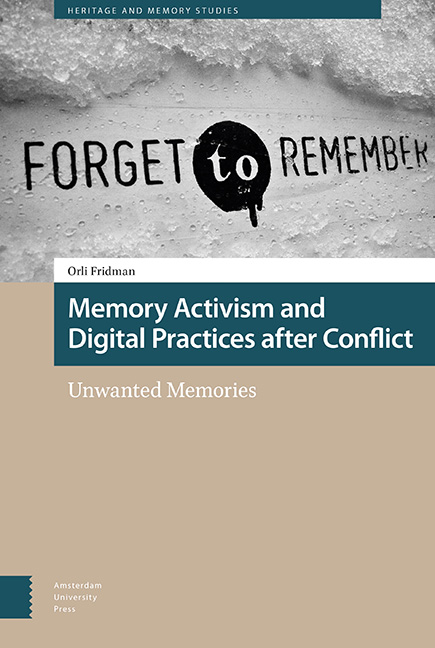Book contents
- Frontmatter
- Table of Contents
- List of Figures
- Preface
- Acknowledgements
- Introduction: Memory Activism and Alternative Commemorative Practices after Conflict
- 1 Unwanted Memories of (the Wars of) the 1990s
- 2 ‘Not in My Name’: From Anti-War to Memory Activism: The First Generation
- 3 ‘Too Young to Remember, Determined Never to Forget’: The Second Generation
- 4 Hashtag Memory Activism: Digital Memory Practices and Online Commemorations
- 5 Regions of Memory: The Post-Yugoslav Space as a Region of Memory Activism
- Epilogue: Unwanted Pasts in an Unresolved Present
- Appendices
- Bibliography
- Index
4 - Hashtag Memory Activism: Digital Memory Practices and Online Commemorations
Published online by Cambridge University Press: 07 October 2022
- Frontmatter
- Table of Contents
- List of Figures
- Preface
- Acknowledgements
- Introduction: Memory Activism and Alternative Commemorative Practices after Conflict
- 1 Unwanted Memories of (the Wars of) the 1990s
- 2 ‘Not in My Name’: From Anti-War to Memory Activism: The First Generation
- 3 ‘Too Young to Remember, Determined Never to Forget’: The Second Generation
- 4 Hashtag Memory Activism: Digital Memory Practices and Online Commemorations
- 5 Regions of Memory: The Post-Yugoslav Space as a Region of Memory Activism
- Epilogue: Unwanted Pasts in an Unresolved Present
- Appendices
- Bibliography
- Index
Summary
Abstract
This chapter examines the growing prevalence of digital memory activism and online commemorations. It introduces the #hashtag #memoryactivism framework as an analytical approach to studying the commemoration of contested pasts on social media, utilizing hashtags as a mnemonic practice. By studying hashtags used by memory activists in Serbia, each related to unwanted memories of the wars of the 1990s, the chapter traces activists’ use of online platforms to engage with forbidden ideas or disputed memories and terminologies. The ways in which the hashtag is being thoughtfully appropriated by activists as part of their memory work in various campaigns is discussed, as is hashtag memory activism as a more nuanced form of both hashtag activism and of memory activism.
Keywords: #hashtag #memoryactivism, online commemorations, digital memory activism, digital mnemonic practice
This chapter examines the growing prevalence of digital memory activism and online commemorations on social media, emblematic of what Hoskins calls the ‘connective turn – the sudden abundance, pervasiveness, and immediacy of digital media’ (2018a, 1). I propose the #hashtag #memoryactivism framework as an analytical approach to studying digital memory activism and online commemorations, and define hashtag memory activism as the online commemoration of contested pasts on social media utilizing hashtags as a mnemonic practice. Thus, hashtag memory activism is a mnemonic tactic that enables and even strengthens the creation of alternative platforms for remembrance, through the sharing and disseminating of alternative knowledge about a contested past in the midst of or after conflict. I examine the ways memory activists use existing online platforms, particularly social media applications such as Twitter (as well as Facebook and YouTube), to innovate and complement their existing ongoing mnemonic practices. Indeed, hashtag memory activism, as well as online commemorations, are never isolated online actions but appear in connection to local memory politics unfolding onsite, demonstrating the inseparability of digital communications from the practices and processes of remembering (Merrill et al. 2020).
The use of hashtags as a mnemonic practice, and one that has become most common among the younger (second) generation of memory activists, is my focus here.
- Type
- Chapter
- Information
- Memory Activism and Digital Practices after ConflictUnwanted Memories, pp. 131 - 160Publisher: Amsterdam University PressPrint publication year: 2022



